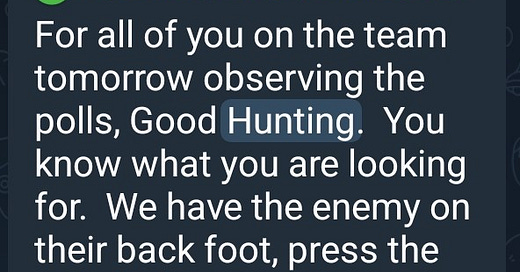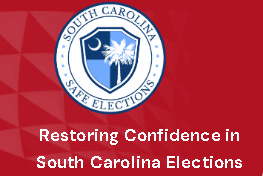Conspiracy Group Plans to Send Sensitive Election Info Abroad
As conspiracy theories fuel a spike in violent threats against election workers, a mysterious website linked to election conspiracists asks Americans to steal sensitive election data.
Violent threats against election officials have surged nationwide, placing unprecedented strain on the critical workforce that safeguards our democracy.
The reason? Conspiracy theories claiming US elections are rigged are escalating, and their proponents are gearing up to sow chaos nationwide on Election Day.
A Brennan Center survey reveals that in 2024, 38% of election officials experienced threats, harassment, or abuse while on the job. More than half said they were concerned for the safety of their co-workers.
These threats have contributed to the departure of one third (36%) of top election officials since 2020, leaving local election boards scrambling to fill critical gaps.
In South Carolina, the situation is even more severe. Charleston County Board of Elections Director Isaac Cramer reports that targeted threats have driven over 70% of South Carolina’s top election workers to leave since 2020.
Testifying before the Senate, Cramer described how a specific group targeted poll workers and disrupted voting during the 2022 primaries, driven by the unproven belief that the 2020 election was stolen.
He highlighted a chilling message from the group’s Telegram chat, which framed poll workers as enemies to be hunted: “For all of you on the team tomorrow observing the polls, Good Hunting. You know what you are looking for. We have the enemy on their back foot, press the attack.”
The group, SC Safe Elections, was formed in response to unproven claims of widespread voter fraud in the 2020 election. Although its website describes the group as nonpartisan, SC Safe Elections’ tactics align with broader Republican strategies to undermine public trust in election integrity and mobilize challenges to voting procedures on Election Day. Messages in the group’s Telegram chat make their intentions plain, with members expressing commitment to a Trump victory.
Recently, SC Safe Elections lost a legal battle to obtain South Carolina’s Cast Vote Records (CVRs)—detailed voting records used for audits that show how each vote was cast at the precinct level.
In most states, CVRs are not publicly available due to the risk of exposing voter identities through data analysis. Ballot secrecy protects election integrity as well as Americans’ constitutional rights to freedom of speech and privacy.
In May, a judge dismissed the group’s lawsuit, citing these constitutional concerns and upholding the importance of ballot secrecy. However, this hasn’t deterred SC Safe Elections from seeking sensitive election data through other channels.
On the group’s “Reporting Anomalies” page, they encourage supporters to submit allegations of voter fraud and sensitive election data to an affiliated website known as ElectionEyes.
Here’s the concerning part:
ElectionEyes provides a step-by-step guide on how to download Cast Vote Records from voting machines and upload them to its platform, which is hosted overseas in Sweden.
This approach appears to be aimed at sympathetic election officials or IT staff with access to voting data.
Leaking sensitive election data to an unauthorized third party such as ElectionEyes is likely a violation of federal law,
including Help America Vote Act, Computer Fraud and Abuse Act, and the Federal Election Integrity Act.
ElectionEyes’ webhost relies on 2 Russian companies to deliver web traffic (about 6% of its total network), which raises serious concerns about Russia’s ability to intercept or manipulate sensitive 2024 election data.
Cast Vote Records are sensitive election data that should not be stolen and leaked to the public, or worse, unknown foreign entities.
This isn’t the first time Trump allies are attempting to commit election crimes in a perverse and ironic effort to prove election fraud.
Former Mesa County clerk Tina Peters is serving a 9-year prison sentence for masterminding a conspiracy to steal and leak voting machine data. Ironically, in her attempt to expose supposed election fraud, Peters herself abused her power and committed election interference.
Encouraging election officials to upload election data to unregulated overseas platforms is a grave risk to election security. CVRs, especially when publicly accessible or in the hands of foreign governments, can be cross-referenced with other data to potentially infer voter identities.
Election records, such as CVRs, are protected under election security protocols to ensure they remain tamper-proof and accessible only through official channels.
In the wrong hands, CVRs would be a gold mine for the intelligence services of America’s adversaries seeking to influence our elections.
Moving sensitive election data beyond secure state-controlled databases makes it vulnerable to unauthorized access and manipulation. This creates a risk not only to individual privacy but to the reliability of election audits and recounts—core components of election integrity.
Of course, the ultimate irony is the people obsessed with spreading accusations of election interference seem to be willing to flirt with interference themselves.
Despite all this, there are millions of Americans working to ensure the 2024 elections are as fair and secure as possible. Public servants are not evil scheming bureaucrats, but everyday Americans working hard behind the scenes to keep the wheels of democracy turning.






